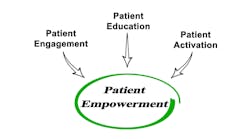Dear Mr. Guerra,
I have been reading HCI a long time, and your piece, “When the Time is Right” (http://www.healthcare-informatics.com/time_is_right) caught my eye recently.
I am a chiropractor, so I read and keep hoping I'll find more about my small slice of the healthcare field, knowing that we'll never get that much press. What we do just isn't as glamorous or as newsworthy as stuff going on in other allied disciplines.
Regardless, we have to deal with information management and all the same headaches too. Since most chiropractors I know run private and often solo practitioner clinics, we rarely have the budgetary means to support all of the fancy systems that most MDs grow accustomed to while working in large clinics or hospitals.
Knowing that advertising dollars fund the bulk of the expense of publishing any printed matter today, I know my wish list won't find much sympathy, but here goes. Why does the Open Source, i.e., Linux community have such rare showing in the field? Have there ever been any reviews, or ongoing coverage of new tools, new applications that are written for those of us who eschew Microsoft and prefer instead the raw horsepower and speed that comes with open source software?
Does anyone raise the issue or does anyone ask for more coverage of this topic? I love to write, but don't profess to be Shakespeare or Thoreau or anything polished. I write what I feel and observe and see around me.
How might I jump into the fray and raise a voice in support of free and open source applications?
Please advise.
Dr. Scott S. Jones
Dear Mr. Guerra,
I appreciate your thoughts on the physician adoption of EMR (“When the Time is Right”).
I have had an EMR in my office for 14+ years. It is a competitive disadvantage to have, due to cost, maintenance, and lack of interoperability. I live in a community with a “free” EMR and it is NOT free; as a matter of fact, it is expensive.
When physicians adopt an EMR, they need to keep the infrastructure of paper in place, as the substitutes are expensive and time-consuming (scanning, buying interfaces, etc). Thus, costs go up and NO reimbursement advantage is obtained.
I agree with your conclusion that the real reason to go through the transition is money - not “improved patient care.” As such, we will not do it in Massachusetts until money talks.
Cort Garrison, M.D.Medical Director of InformaticsSalem Hospital
Dear Mr. Guerra,
I read your editorial, “When the Time is Right” with interest. While I agree with the reasons you outline regarding the lack of adoption of EMR, I think the main reason is much more basic. In my experience, the main reason is simply resistance to - and fear of - change. The nature of the change, positive or negative, is irrelevant.
All of the examples of resistance to a new system - financial concerns, ease of use issues and lack of personal benefit - are, at their core, rationalizations of fear of change.
In my work as a business systems analyst with a clinical background (I'm an R.N.), I found that with projects that are funded, the implementation phase is the point at which a project is most likely to fail. All too often, the root cause of the failure is that the users were resistant to change.
Unless the groundwork is done to prepare users for change, there will usually be resistance. The key to preparation I've found most effective is to present the change to users as an absolute by saying, “Change is coming, let's talk about how to deal with it.” On a larger scale, I think that's what is beginning to happen in discussions of health care EMRs.
Thank you for your editorial, it made me think!
Sincerely,
Richard Dilbeck, R.N.


